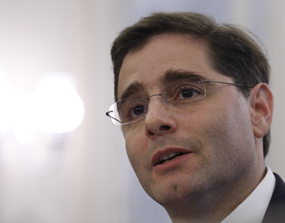| Home | Blog | Ask This | Showcase | Commentary | Comments | About Us | Contributors | Contact Us |

The new FCC chairman is making all the right promises. Can he fulfill them?ASK THIS | July 189, 2009Julius Genachowski, with connections to Obama and prior experience at the FCC, says he will promote universal, affordable, open broadband. To do that and to fulfill other promises, he first will have to take the agency out of the grip of the telecommunications firms it is supposed to regulate. Press coverage here isn’t just desirable, it’s vital. By Bruce Kushnick and Alexander Goldman In his first meeting with FCC staff, Genachowski listed these goals, quoted verbatim:
He also stated that FCC decisions “would be open and transparent,” “ fact-based and data-driven.” Genachowski was a Harvard Law School classmate of President Obama’s and an adviser to Obama during the 2008 election campaign. He also has been an aide to two former FCC chairmen. He is both knowledgeable and connected and thus in an ideal position to lead the agency. The FCC has five commissioners, including the Chair. They are selected by the President and serve five-year terms. By law no more than three members can be from any one party. There are currently three commissioners, with two awaiting confirmation by Congress. The role of the FCC is to regulate interstate and international communications over radio, television, wire, satellite and cable. In 2004, then President Bush tasked the FCC with delivering universal, affordable broadband to America. The goal was not achieved—hardly any movement was made—but it has been adopted by the Obama administration in two Internet stimulus programs, the Broadband Technology Opportunities Program (BTOP) and the Broadband Investment Program of the Rural Utilities Service of the U.S. Department of Agriculture. The groups are to disburse up to $7.2 billion in grants and loans by September 2010. Preparing for the future The future of the U.S. Internet may be riding on decisions that the FCC must make faster than ever before. As the government attempts to balance haste and urgency, now is a good time for reporters and editors to put some questions to Genachowski and to the Obama administration's FCC. Q. How does the FCC plan to escape the influence of large telecom companies such as Verizon and AT&T and respond to the needs of ordinary citizens and small businesses? Q. Genachowski spoke about the importance of data but one criticism of the FCC is that it constantly makes decisions using outdated, untrustworthy data. What will he do to obtain actual data not tainted by special interests? Q. Regarding broadband, the U.S. is now 15th or so in penetration and use. Other countries have universal or almost universal broadband with speeds that are commonly 20 to 100 times faster than those offered in the U.S. High speed is vital for advanced technology and new services. Aside from promises, what are Genachowski’s plans to improve broadband in the U.S.? It’s not just the FCC that needs to turn over a new leaf—it’s the mainstream press as well. The fact is, the press has played a negative role until now, failing to penetrate the murky connections between special interests and the anti-competitive policies they have advocated and won.
The U.S., which invented the Internet, still has the resources to compete, but only if the FCC throws off a decade of inaction, overcomes the surrender that is now embedded in precedent, and undoes its capture by the industry it regulates. We have some suggestions of our own, a set of recommendations for Genachowski and the other Commissioners. As for our credentials: [Bruce Kushnick is executive director of an advocacy group, TeleTruth, and the telecommunications research firm, New Networks Institute. He writes frequently for NiemanWatchdog.org. Alex Goldman has been a telecommunications journalist for nine years and is currently senior editor at InternetNews.com.] These are our recommendations: 1) Obtain current market data instead of recycling data that's up to two decades old Bad data used in FCC decisions have stunted economic growth, limited choice, undervalued innovation, raised the price of service, and prevented America from realizing its potential. According to December 2008 statistics from the Organization for Economic Cooperation and Development (OECD), the U.S. ranks 15th in the world in broadband usage per capita. The FCC has not been following its own data quality guidelines. In 2008, Bruce Kushnick's New Networks Institute found that the agency was basing policy decisions on data from 1992, 1997, 1998, 1999, 2000, 2001, or 2002. Outdated data were copied again and again and used in hundreds of decisions. For example, 2008 documents include, as though current, wireless paging data from 2002, license auction data from 2000 and earlier, "wireless cable" market data from 2005, and so on. This use of inaccurate and out of date information has harmed the economy, especially small businesses. (Click here for a complaint TeleTruth filed with the FCC over the issue.) 2) Acknowledge the actual price of telephone service According to the FCC, the cost of a one-minute cell phone call is $.06, and the cost of a one-minute long distance call is about the same. But these reported prices ignore fees and hidden charges, including monthly fees. Add those in, and factor in average usage, and the actual price is much higher. A recent survey by Bruce Kushnick's New Networks Institute found that a one-minute call could cost $3.02 per minute and the average cost was $.55 a minute when monthly charges and fees were factored in. Virtually every statistic the FCC puts out about the cost of service (the cost per minute or anything else, including competition for local and long distance service) is essentially made up. Statistics should be based on facts, as Genachowski is promising. 3) Reinstate basic reporting requirements In 2008, the FCC decided that phone company networks were competitive and that the phone companies no longer should be required to supply basic information on service quality, customer satisfaction, infrastructure and operating data gathering requirements, and other data that had been long required. This at a time when the FCC was increasing the burden on Wireless ISPs, most of which are small businesses. (See this piece by Alex Goldman.) FCC commissioner Michael Copps wrote a sharply-worded dissent in December, 2008, about the removal of reporting requirements.
4) Acknowledge the influence of fake public interest groups on real policy decisions How did America fall from first to fifteenth place in broadband? One main reason is that bad data and politically motivated reports provided an excuse for inaction. And the reason for that is that the FCC in recent years has been manipulated by large corporate concerns – what one could call regulatory capture. Accurate data would have signaled to the FCC that America was on a downward course. The telecoms influence the FCC by assaulting it in waves of lies. They deploy fake citizens groups and co-opted ones that lobby the FCC on their behalf. They also employ former FCC or government staffers turned lobbyists. The corporations have enough funding to send these groups to the FCC almost every day. These are stark statements—and certainly deserving of follow-up by journalists. Reporters who want to check them out can start with documentation produced by Bruce Kushnick here. In addition, writer Art Brodsky at a blog called Public Knowledge, has been reporting on conflicts of interest in broadband mapping. Press coverage isn’t just desirable, it is vital. Saul Hansell of The New York Times wrote early this year about a footnote in a bill that could have given $1.6 billion to Verizon. The item was removed after its exposure in The Times. 5) Ask consumers, not corporations, to be on the FCC's Consumer Advisory Committee Today, the FCC's consumer advisory committee contains representatives of groups such as Cablevision Systems, Communications Workers of America, Dish Network Corporation, National Association of Broadcasters, Verizon Communications, Inc. It also has the League of United Latin America Citizens, which is heavily financed by AT&T and Verizon, as well as the Digital Television Transition Coalition, a group that is supposed to be leading the DTV transition but that is also funded by the industry. These organizations are not unbiased observers. Each has a special interest in FCC decisions. None represents consumers. If the FCC wants an advisory committee comprised of stakeholders such as union representatives, technology advocates, and even the companies it regulates, it should call that committee something other than the Consumer Advisory Committee. A more accurate name would be the Lobbyists' Advisory Committee. These issues are just for starters. There's plenty of work for Genachowski.
|





